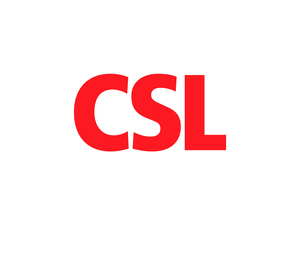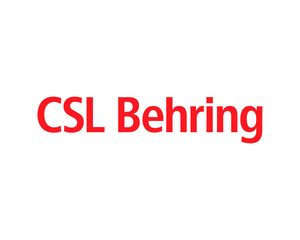CSL Behring Presents Phase III Data for IDELVION® for Hemophilia B at the World Federation of Hemophilia 2016 World Congress
New analyses from global PROLONG-9FP clinical development program show:
- Adult patients prolonged dosing interval to up to 21 days for routine prophylaxis in extension study
- Mean annualized spontaneous bleeding rate (AsBR) decreased in hemophilia B patients who continued long-term prophylaxis with IDELVION
- Single dose of IDELVION was sufficient to maintain factor IX levels throughout majority of surgical procedures, according to sub-study
ORLANDO, Fla., July 26, 2016 /PRNewswire/ -- CSL Behring today announced new data from its Phase III PROLONG-9FP clinical development program evaluating IDELVION® [Coagulation Factor IX (Recombinant), Albumin Fusion Protein], the company's novel, long-acting recombinant albumin fusion protein for treating hemophilia B. The data, from a Phase III study and an ongoing extension study, assessed the long-term efficacy and safety of IDELVION for routine prophylaxis in previously treated children and adults with hemophilia B. The results showed that extended prophylaxis treatment regimens effectively prevented bleeds while also reducing overall IDELVION consumption. The findings were presented at the XXXII International Congress of the World Federation of Hemophilia (WFH) in Orlando, Fla., July 24 – 28, 2016. Separately, an abstract reporting efficacy and safety results of IDELVION in hemophilia B patients undergoing surgery was also presented.
"These new data corroborate findings from the pivotal Phase III trials from PROLONG-9FP and demonstrate that IDELVION prophylaxis maintains robust efficacy and safety over time in pediatric and adult patients living with hemophilia B," said Elena Santagostino, M.D., Ph.D., Professor in the Medical School of Clinical and Experimental Hematology at the University of Milan/IRCCS Maggiore Hospital, and lead investigator of the PROLONG-9FP clinical development program. "Interim results from the extension study are promising and suggest that extended treatment intervals of up to 10 and 14 days are achievable in children less than 12 years of age with hemophilia B, and even more prolonged treatment intervals of up to 21 days are conceivable for older patients."
In 2016, IDELVION was approved in the U.S. in March, the European Union in May and Canada in January. In the U.S., IDELVION is indicated for use in children and adults with hemophilia B for: routine prophylaxis to prevent or reduce the frequency of bleeding episodes; on-demand control and prevention of bleeding episodes; and the perioperative management of bleeding (around the time of surgery). Regulatory approvals of IDELVION were based on results from the global PROLONG-9FP clinical development program, which included five Phase I through Phase III open-label, multicenter studies evaluating the pharmacokinetics, safety and efficacy of IDELVION in children and adults with hemophilia B.
Key Study Findings
- Long-term safety and efficacy of recombinant fusion protein linking coagulation factor IX with albumin (rIX-FP) in previously treated patients with hemophilia B (Poster #122): Researchers reported on a Phase III study assessing the efficacy and safety of IDELVION for prophylaxis treatment in previously treated patients (ages 12 to 65) with hemophilia B. Patients were pooled from three clinical trials in the PROLONG-9FP program over a four-year period. The study included 15 patients who initially participated in a Phase II study and then enrolled in the Phase III study to be treated with prophylaxis once every 7 days. After ≥26 weeks, patients who were well controlled on the once-weekly regimen had the option to switch to an extended 10- or 14-day interval. The Phase III results showed that during 7, 10 and 14 -day prophylaxis, the median annualized bleeding rate (ABR) remained low (0.00, 0.00 and 1.08 respectively), and the annualized spontaneous bleeding rate (AsBR) was 0.00 in all regimens (7, 10 and 14-day prophylaxis). Monthly consumption of IDELVION remained constant over the 7-day regimen and decreased with each extended treatment interval, from 245 IU/kg to 220 IU/kg with 10-day prophylaxis, to 158 IU/kg with 14-day prophylaxis. No patient developed an inhibitor to factor IX or antibodies to IDELVION.
- Interim results of a Phase IIIb safety and efficacy extension study of a recombinant fusion protein linking coagulation factor IX with albumin (rIX-FP) in patients with hemophilia B (Poster #113): Children (<12 years) and adults and adolescents (ages 12 to 65) with hemophilia B (factor IX activity ≤2%) who completed one of the two Phase III trials in the PROLONG-9FP program were included in this ongoing Phase IIIb, open-label extension study. A total of 76 pediatric and adult patients continued to receive routine IDELVION prophylaxis, with the option of extending from once-weekly to 10- and 14-day intervals. Well-controlled adult patients (≥18 years of age) taking a 14-day regimen could choose to prolong their treatment interval to 21 days. Interim results showed that 85 percent of adults and adolescents switched from once-weekly to 10- or 14-day prophylaxis regimens; nine of these patients have subsequently prolonged the treatment interval to 21 days while increasing their IDELVION dose to 100 IU/kg. In addition, 46 percent of pediatric patients have extended their prophylaxis regimens from 7- to 10- to 14-day intervals. More than 50 previously treated patients in the PROLONG-9FP program have achieved ≥100 exposure days of treatment without developing inhibitors to factor IX or antibodies to IDELVION.
- Efficacy and safety of long-acting recombinant fusion protein linking factor IX with albumin (rIX-FP) in hemophilia B patients undergoing surgery (Poster #84): This abstract reported on the surgical sub-studies included in the Phase III studies as part of the PROLONG-9FP clinical program. Investigators evaluated the safety and efficacy of IDELVION in a total of 21 minor or major surgeries in 19 adult and pediatric patients with hemophilia B (factor IX activity ≤2%). Hemostatic efficacy was assessed both during surgery and up to 72 hours post-procedure. For all 21 procedures, including nine major orthopedic surgeries in eight patients, the investigators rated the hemostatic response as excellent (n=17) or good (n=4). In all but one procedure, a single preoperative dose of IDELVION was sufficient to maintain factor IX activity levels throughout the surgical procedure without the need for additional intra- or postoperative dosing on the day of surgery. For the orthopedic procedures, the median consumption was 87 IU/kg prior to surgery, and 375 IU/kg during the 14-day postoperative period. For all procedures, median consumption was 375.3 IU/kg during the 14-day postoperative period, which was lower than with conventional factor IX replacement therapies. Adverse reactions during the surgical period were mild to moderate and considered unrelated to treatment. None of the patients developed inhibitors to factor IX or antibodies to IDELVION.
"The breadth of IDELVION data being shared at WFH 2016 demonstrates our promise to advance research that meets the needs of patients with hemophilia B," said Dr. Andrew Cuthbertson, Chief Scientific Officer and Director of R&D, CSL Limited. "We believe IDELVION will positively impact patients by prolonging increased factor levels and significantly reducing the treatment burden associated with frequent prophylactic dosing."
About Hemophilia B
Hemophilia B is a congenital bleeding disorder characterized by deficient or defective factor IX; nearly all affected patients are male. People with hemophilia B may experience prolonged or spontaneous bleeding, especially into the muscles, joints, or internal organs. According to the U.S. Centers for Disease Control and Prevention, the condition affects approximately one in 25,000 male births.
About IDELVION®
CSL Behring engineered IDELVION to extend the half-life of recombinant factor IX through fusion with recombinant albumin. CSL Behring selected recombinant albumin as its fusion partner for its coagulation factor proteins due to its long physiological half-life.
IDELVION is approved in the United States, European Union and Canada. Regulatory agencies in Australia, Switzerland and Japan are also currently reviewing CSL Behring's license applications for IDELVION.
For more information about IDELVION, including full prescribing information, please visit http://labeling.cslbehring.com/PI/US/Idelvion/EN/Idelvion-Prescribing-Information.pdf.
U.S.-Only: Important Safety Information
IDELVION®, Coagulation Factor IX (Recombinant), Albumin Fusion Protein (rIX-FP), is indicated in children and adults with hemophilia B (congenital factor IX deficiency) for:
- On-demand control and prevention of bleeding episodes
- Perioperative management of bleeding
- Routine prophylaxis to prevent or reduce the frequency of bleeding episodes
IDELVION is not indicated for induction of immune tolerance in patients with hemophilia B.
IDELVION is contraindicated in patients who have had life-threatening hypersensitivity to the product or its components, including hamster proteins.
IDELVION is for intravenous use only. IDELVION can be self-administered or administered by a caregiver with training and approval from a healthcare provider or hemophilia treatment center. Higher dose per kilogram body weight or more frequent dosing may be needed for pediatric patients.
Hypersensitivity reactions, including anaphylaxis, are possible. Advise patients who self-administer to immediately report symptoms of hypersensitivity, including angioedema, chest tightness, hypotension, generalized urticaria, wheezing, and dyspnea. If symptoms occur, discontinue IDELVION and administer appropriate treatment.
Development of neutralizing antibodies (inhibitors) to IDELVION may occur. If expected factor IX activity plasma levels are not attained or bleeding is not controlled with appropriate dose, perform an assay to measure factor IX inhibitor concentration. Factor IX activity assay results may vary with the type of activated partial thromboplastin time reagent used.
Thromboembolism (e.g., pulmonary embolism, venous thrombosis, and arterial thrombosis) can occur when using factor IX-containing products. In addition, nephrotic syndrome has been reported following immune tolerance induction in hemophilia B patients with factor IX inhibitors and allergic reactions to factor IX.
The most common adverse reaction (incidence ≥1%) reported in clinical trials was headache.
About CSL Behring
CSL Behring is a global biotherapeutics leader which is driven by its promise to save lives. Focused on serving patients' needs by using the latest technologies, we develop and deliver innovative therapies that are used to treat coagulation disorders, primary immune deficiencies, hereditary angioedema, inherited respiratory disease, and neurological disorders. The company's products are also used in cardiac surgery, organ transplantation, burn treatment and to prevent hemolytic disease of the newborn.
CSL Behring operates one of the world's largest plasma collection networks, CSL Plasma. The parent company, CSL Limited (ASX:CSL), headquartered in Melbourne, Australia, employs more than 16,000 people with operations in more than 30 countries. For more information visit www.cslbehring.com and follow us on www.Twitter.com/CSLBehring.
Contact:
Greg Healy
CSL Behring
Office: 610-878-4841
Mobile: 610-906-4564
[email protected]
SOURCE CSL Behring
Related Links
WANT YOUR COMPANY'S NEWS FEATURED ON PRNEWSWIRE.COM?
Newsrooms &
Influencers
Digital Media
Outlets
Journalists
Opted In





Share this article